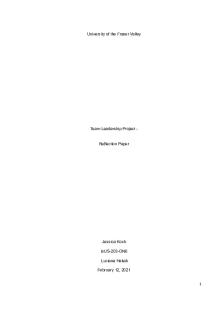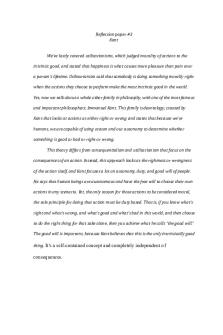Rachel Boba Reflection Paper PDF

| Title | Rachel Boba Reflection Paper |
|---|---|
| Course | Special Problems in Criminal Justice |
| Institution | Utah Valley University |
| Pages | 2 |
| File Size | 68.9 KB |
| File Type | |
| Total Downloads | 50 |
| Total Views | 146 |
Summary
Reflection on Rachel Boba's Problem Analysis in Policing study....
Description
Rachel Boba Paper Reflection In her paper, Problem Analysis in Policing, Rachel Boba uses Herman Goldstein’s definition of problem analysis as “an approach/method/process conducted within the police agency in which formal criminal justice theory, research methods, and comprehensive data collection and analysis procedures are used in a systematic way to conduct in-depth examination of, develop informed responses to, and evaluate crime and disorder problems” (Boba pg. 2). Problem analysis informs the police as to not only when and where crimes are occurring, but why. If used to its full potential, it can lay out exactly why crimes are occurring therefore making it easier for departments to prevent crime, instead of only responding to crimes that have already occured. Hiring people for the job within police departments seems to be where a lot of the issues are, as stated in the paper, “most agencies in the United States are fairly small and do not employ any type of analyst, much less a problem analyst.” (Boba, pg. 16) There is a plethora of things that would be preferable for this problem analyst to know, including knowledge in criminological theory, literature (classic and current research literature), research methods, data and data integrity, technology, statistics, geographic information systems and spatial analysis, the history and current state of policing, the dynamics and nature of policing, policing and the criminal justice system, problem-oriented policing, an understanding of crime problems, and urban issues and policies/strategic planning. And if that wasn’t enough, they would also need to have skills in communication, critical thinking, research skills, use of technology, data, and project management (Boba pg. 17-26). With all of these skills and knowledge required, expecting one person to do it within a police department is just unrealistic - just as unrealistic as it may seem to these police departments to have to hire multiple analysts to cover all these bases, when they had no problem analysts previously. The stance this paper takes on problem analysis is that “analysis is crucial to problem solving and, more generally, to more effective policing.” I do agree with this stance, as policing and its policies and procedures should be in a constant state of improvement. Nothing should ever be happening for the sake of “tradition” or “that’s how it’s always been done.” While it may seem like so much for individual police departments to have to take on, hiring analysts or even training those they already have hired (who have gone through college and earned higher degrees such as a Masters) to be problem analysts. It isn’t right to continue allowing (for lack of a better term) crime to happen, without doing anything to research why it’s a recurring issue. Especially in lower income communities, where drug and property crimes run rampant and all these departments do is respond - problem analysis could really benefit both the department and the community with just some additional funding and work to get there. Citations
Boba, R., Ph.D. (2003). Problem Analysis in Policing. Problem Analysis in Policing. doi:01/28/2021...
Similar Free PDFs

Rachel Boba Reflection Paper
- 2 Pages

Reflection Paper
- 2 Pages

Reflection Paper
- 4 Pages

Reflection Paper
- 2 Pages

Reflection paper
- 3 Pages

Reflection paper for pino
- 2 Pages

Conflict Reflection Paper
- 8 Pages

Haudenosaunee reflection paper
- 3 Pages

Reflection paper rubric 05
- 1 Pages

Managment Reflection Paper
- 12 Pages

Reflection Paper chapter 5
- 1 Pages

Bev Reflection Paper 1
- 4 Pages

Paul Simon Reflection Paper
- 2 Pages

Reflection-paper-mulanay
- 2 Pages

Reflection Paper Sociology
- 5 Pages
Popular Institutions
- Tinajero National High School - Annex
- Politeknik Caltex Riau
- Yokohama City University
- SGT University
- University of Al-Qadisiyah
- Divine Word College of Vigan
- Techniek College Rotterdam
- Universidade de Santiago
- Universiti Teknologi MARA Cawangan Johor Kampus Pasir Gudang
- Poltekkes Kemenkes Yogyakarta
- Baguio City National High School
- Colegio san marcos
- preparatoria uno
- Centro de Bachillerato Tecnológico Industrial y de Servicios No. 107
- Dalian Maritime University
- Quang Trung Secondary School
- Colegio Tecnológico en Informática
- Corporación Regional de Educación Superior
- Grupo CEDVA
- Dar Al Uloom University
- Centro de Estudios Preuniversitarios de la Universidad Nacional de Ingeniería
- 上智大学
- Aakash International School, Nuna Majara
- San Felipe Neri Catholic School
- Kang Chiao International School - New Taipei City
- Misamis Occidental National High School
- Institución Educativa Escuela Normal Juan Ladrilleros
- Kolehiyo ng Pantukan
- Batanes State College
- Instituto Continental
- Sekolah Menengah Kejuruan Kesehatan Kaltara (Tarakan)
- Colegio de La Inmaculada Concepcion - Cebu
